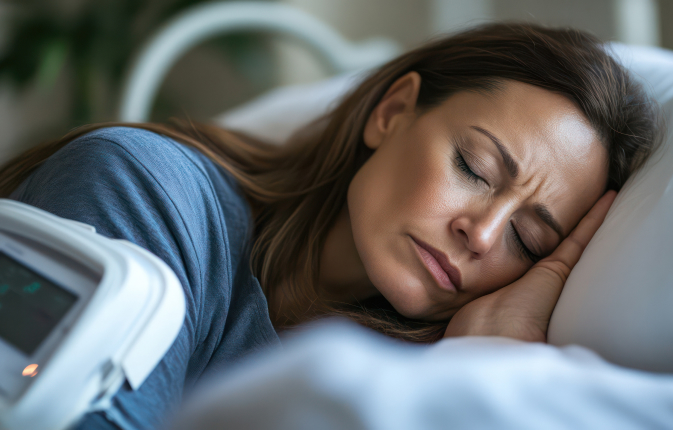Sleep Apnea
What is Sleep Apnea?
Sleep apnea is a sleep disorder in which a person’s breathing repeatedly stops and starts during sleep. These pauses in breathing, known as apneas, can last from a few seconds to a minute and may occur dozens or even hundreds of times during the night. This disruption in breathing reduces the oxygen levels in the blood, leading to poor sleep quality and increased health risks.

What are the Types of Sleep Apnea?
- Obstructive Sleep Apnea (OSA): This is the most common form and occurs when the muscles in the throat relax excessively during sleep, causing a temporary blockage of the airway.
- Central Sleep Apnea (CSA): In this type, the brain fails to send the correct signals to the muscles that control breathing, leading to pauses in breathing.
- Complex or Mixed Sleep Apnea: This is a combination of both obstructive and central sleep apnea.
What are the Symptoms of Sleep Apnea?
- Loud snoring
- Gasping or choking during sleep
- Pauses in breathing observed by a partner
- Daytime sleepiness or fatigue
- Morning headaches
- Difficulty concentrating
- Irritability or mood changes
Risk factors for sleep apnea include being overweight, having a large neck circumference, being male, being older, and having certain medical conditions like high blood pressure or diabetes. Sleep apnea is also more common in people with a family history of the condition.
Key Components of Sleep Apnea
Sleep apnea can lead to serious health complications if untreated, including an increased risk of high blood pressure, heart disease, stroke, diabetes, and cognitive issues.
How do I know
if I have Sleep Apnea?
Diagnosis is usually confirmed through a sleep study (polysomnography), and treatment options vary depending on the severity.
Common treatments include:
- Continuous Positive Airway Pressure (CPAP) therapy: A machine that delivers steady air pressure to keep the airway open during sleep.
- Oral appliances: Devices that help keep the throat open by repositioning the jaw.
- Lifestyle changes: Weight loss, sleeping on one’s side, and avoiding alcohol or sedatives.
- Surgery: In more severe cases, surgery may be necessary to remove excess tissue or adjust the structure of the airway.
Proper management of sleep apnea can greatly improve sleep quality and overall health.
Schedule Your Appointment
We are accepting new patients! Request an appointment today to be seen by top pulmonologist in Las Vegas, Dr. Kevin Tsui.
Request Appointment